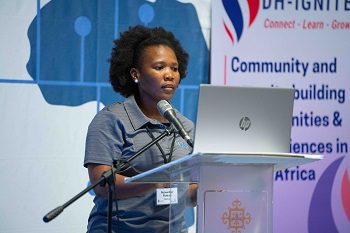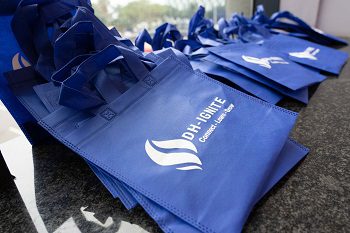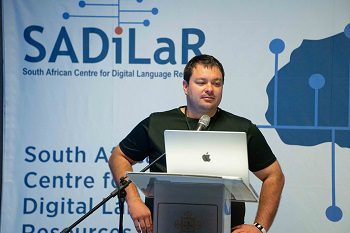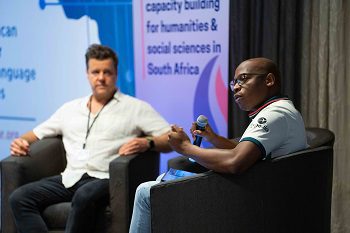“At the heart of digital humanities is coding, once you can code in R or Python, a world of possibilities opens up to you,” said Professor Kevin Durrheim of the University of Johannesburg (UJ), speaking at SADiLaR’s first DH-IGNITE event which took place in Umhlanga, KwaZulu-Natal (KZN) in October this year.
The goal of the DH-IGNITE events is to build a community of practice of digital humanities among researchers in South Africa to learn to code and apply computational and digital technologies to their own research and teaching. This effort is key to the SADiLaR mandate, to focus on research and capacity building for digital humanities (DH).
“In order for SADiLaR’s digital humanities programme to succeed we need to have broad engagements across the academy and all critical stakeholders in the country,” said Professor Langa Khumalo, SADiLaR executive director. “Through these regional events we are trying to bring scholars together to foster networks and grow regional communities of practice in the area of digital humanities and computational social sciences.”
DH-IGNITE is a new initiative of SADiLaR’s ESCALATOR programme, an initiative to build an inclusive and active community of practice in digital humanities and computational social sciences in South Africa. The event in KZN was the first of a series of regional events planned across South Africa, strategically located for easy attendance by staff and researchers of all 26 public universities in the country.
Speaking at the KZN event, Anelda van der Walt, ESCALATOR programme manager, spoke of the challenges ESCALATOR faced in building a community during COVID-19 pandemic and lockdowns.
“ESCALATOR started in December 2020 and we have not been able to get our communities to start building relationships, because building relationships from scratch through online platforms is not the same as engaging in person,” she said. Once restrictions were dropped, the ESCALATOR team began planning DH-IGNITE events to allow those engaging in the DH space, or interested in engaging in the space, to meet and interact in person.
DH-IGNITE opened with several presentations on the importance of humanities and social sciences researchers incorporating digital technologies into their work. Noma Maphanga, project manager and data science mentor at ESCALATOR presented on the need to keep moving with new technologies, pointing out how none of the delegates walked to the event, but most likely used cars or buses, and almost certainly no delegates hand-write their papers and publications, choosing instead to use software to make the work faster and better.
“Learning new tools and methods for research may be time consuming in the beginning,” she said, “but they will serve you in the long run, improving the quality and efficacy of your research.”
Other presentations included an understanding of data management principles, such as FAIR (findable, accessible, interoperable and reusable) and CARE (collective benefit, authority to control, responsibility, ethics) principles; as well as presentations showcasing national infrastructure and tools available for digital and computational research. Durrheim presented a new initiative at the University of Johannesburg called UJMethLab to support humanities and social sciences researchers in exploring new methodologies and innovation in research.
Delegates were also treated to lightning talks on various digital humanities projects, including a showcase on poetry and the digital humanities and the Voices of Mzansi project to give a space for communities to engage with the development of technologies in their own languages.
While there were some hands-on practical presentations, the goal of DH-IGNITE was not to teach coding skills, but to introduce delegates to the range of options for learning such skills, and the potential these computational skills have to enhance their research and careers in general.
DH-IGNITE is an invitation to join the ESCALATOR community of practice in computational social sciences and humanities and begin the process of upskilling for the fourth industrial revolution.
“We are in it for the long run,” said van der Walt. “ESCALATOR and the building of our digital humanities community of practice is a five-to-ten-year project, and we look forward to walking this journey with you.”
Visit the website to find out which DH-IGNITE event is nearest to you.











